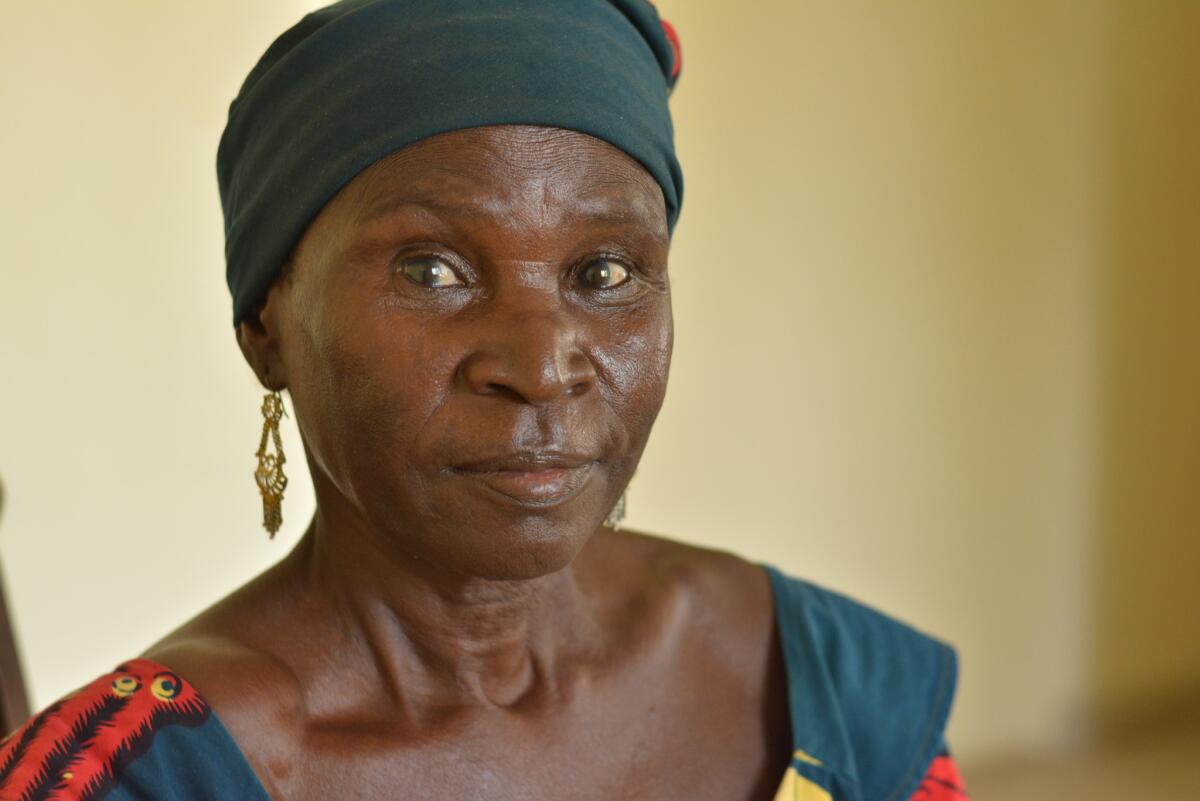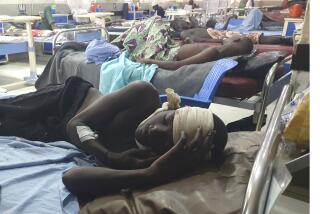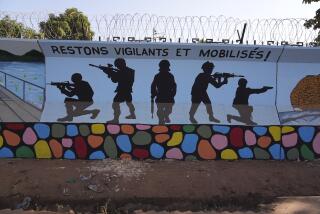Great Read: Boko Haram shows no mercy in Nigeria, wrecking churches, homes, lives

- Share via
When Boko Haram invaded her village last year, the Islamist extremists burned the churches, destroyed Bibles and photographs and forced Hamatu Juwanda to renounce Christianity.
“They said we should never go back to church because they had brought a new religion,” the 50-year-old said. “We were going to be converted to Islam.”
The head of the village, a Muslim, presented her with a thick nylon hijab to cover her head and renamed her Aisha.
She submitted, smarting with rage. Women who didn’t wear the hijab were beaten.
“When I went to the market, I wore the veil,” she said. “But at home, I took it off and prayed.”
The gunmen returned time after time to the village of Barawa, shooting people, burning houses and wearing down the resistance of the villagers.
In September, the attackers came again: 30 turbaned men with covered faces, big guns and camouflage clothing. Juwanda’s husband tried to flee but was shot in the chest and killed.
Horrors became commonplace for Juwanda: She saw a young man shot in the head as he fled along a rural track. She watched a neighboring woman weep bitterly as gunmen abducted her with her children.
“She was crying, but they told her not to,” Juwanda said. “The leader of the group told her, ‘If you cry, it’s useless. If you don’t cry, it’s useless.’ ”
::
In the last year, the government has lost control of vast swaths of the country’s northeast to Boko Haram with barely a fight. In a military-style campaign, the extremist militia has raised its black flag over villages, driven Christians from their farmland and houses, and dragged people from cars at roadblocks, killing “infidels.”
Boko Haram’s insurgency has killed 12,000 people and shattered the northern economy. Schools have been shut down because of attacks that have seen hundreds of schoolgirls kidnapped and schoolboys burned alive in their dormitories.
The crisis encapsulates Nigeria’s myriad problems: its poor governance, its corruption, its abject neglect of the mostly Muslim north, which for years has been the poorest region of the country.
The military’s violent, scattershot approach to the insurgency alienated the public and helps explain how Boko Haram was initially popular in its sweep through the northeast.
Support for Boko Haram has waned as its attacks on civilians have grown more ruthless. But Nigerian President Goodluck Jonathan, a Christian, and the military, lacking the capacity and apparent will to resolve the security crisis, remain deeply unpopular in the north.
Nigeria spends $5.2 billion a year on security, but because of endemic corruption, much of that doesn’t make it to the military’s coffers.
“The army is unable to fight the war. The police are unable to maintain security,” said Clement Nwankwo of the Policy and Legal Advocacy Center, a think tank in the capital, Abuja.
“To me there are only two responses. Military force: Subdue them. And good governance. You’ve got to deliver development. You’ve got to end corruption. That’s what brings it to an end.”
The attacks by the militants intensified last month.
When Boko Haram assaulted a village called Attagara, Michael Yohanna said he and others begged military commanders to defend it.
“They said they had not been given a command,” said Yohanna, an activist in the town of Gwoza. “Even as the attack was going on, they never came.” He said at least 150 people were killed in Attagara.
“As I’m talking to you now, no army has entered there,” he said. “The insurgents came in military vehicles with an armored personnel carrier. They went to the central church and ordered a man to gather people. Then they just shot them.
“Women and children are just languishing in the caves and hills,” he said. “There’s no food. The insurgents looted all the food, they looted all the property.”
::
Haruna Zanga, 63, a farmer from a village called Gavva West, was lying outdoors on a mat when Boko Haram came in March last year. He was slow to see the danger. By the time he was running, militants were chasing close behind him in their SUV. He vaulted a wall into someone’s house, but the gunmen shot him four times.
“When they shot me, I just fell down. They thought I was dead,” he said. “They shot and killed four other people that day.”
As he recovered in a hospital in the northern city of Maiduguri, an old acquaintance who was a Muslim butcher offered a chilling warning.
“He told me to leave. He said, ‘Don’t go back to Gavva West, because if you go there, people are coming to attack that place.’
“I was terrified, but what could I do? I was feeling that they were wicked people bent on destroying society.”
The butcher told Zanga that the mountains near Gwoza were full of caves packed with Boko Haram insurgents.
When he returned to Gavva West a month later, the attacks worsened. His grandson Peter Biye, 18, was abducted and killed for refusing to convert to Islam. Many girls and women were also taken.
In September, insurgents surrounded and attacked the village at dusk, killing nine people. They burned 300 houses, leaving only 26 standing. Zanga and most other villagers fled the next day.
Zanga and dozens of others from the Gwoza area fled to Fuga village in the central part of the country, where they have been offered refuge and land.
“The last attack was the worst,” Zanga said. “They burned the houses. Mine was the first one they burned.”
::
As Christian families left Barawa one by one, Juwanda stayed as long as she could, clinging to her house and land, but the attacks grew more frequent. The last straw was witnessing the abductions of women.
When she finally fled the village in May, she was so petrified that she forgot to take the only photo of her brother, her last surviving sibling. It was hidden under a mattress so the militants wouldn’t see it.
She crossed the border into Cameroon. As soon as she reached safety, she tore off her black-and-white-checked hijab, felt cool air on her throat and breathed free.
She was safe.
“I was very happy,” said Juwanda, who later made her way to Abuja. “I felt the good, fresh air as if I’d come to a marvelous place I could hardly imagine.”
Juwanda is relieved to have escaped Barawa. But she remembers the things she lost: her husband, her small plot of farmland, her house, her Bible, all her clothes, a beaded cross she used to wear before she was forced to take it off.
And the photograph of her brother.
Twitter: @latimesdixon
More to Read
Sign up for Essential California
The most important California stories and recommendations in your inbox every morning.
You may occasionally receive promotional content from the Los Angeles Times.










